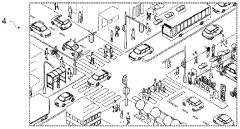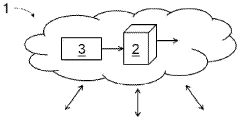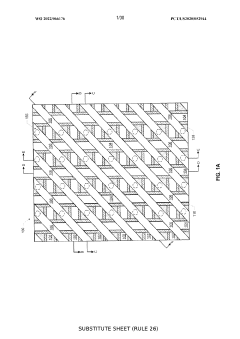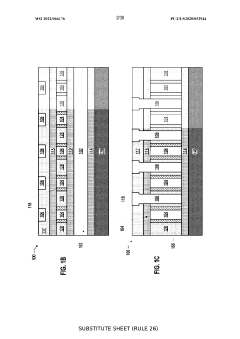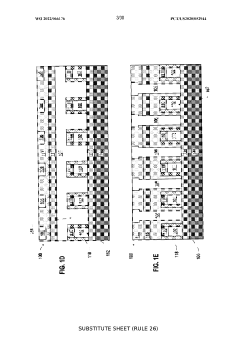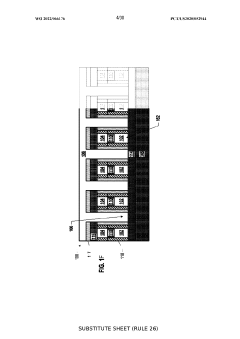Quantum Computing's Role in Smart Cities Data Interpretation
JUL 17, 20259 MIN READ
Generate Your Research Report Instantly with AI Agent
Patsnap Eureka helps you evaluate technical feasibility & market potential.
Quantum Computing in Smart Cities: Background and Objectives
Quantum computing has emerged as a revolutionary technology with the potential to transform various aspects of our lives, including the development and management of smart cities. As urban areas continue to grow and face increasingly complex challenges, the need for advanced data processing and interpretation capabilities becomes paramount. Quantum computing offers a promising solution to address these challenges by leveraging the principles of quantum mechanics to perform computations at unprecedented speeds and scales.
The evolution of quantum computing can be traced back to the early 1980s when physicist Richard Feynman proposed the idea of using quantum systems to simulate other quantum systems. Since then, significant progress has been made in both theoretical and practical aspects of quantum computing. The field has witnessed major breakthroughs in quantum algorithms, error correction techniques, and hardware implementations, leading to the development of early-stage quantum computers by tech giants and startups alike.
In the context of smart cities, quantum computing holds immense potential for enhancing data interpretation and decision-making processes. Smart cities generate vast amounts of data from various sources, including IoT devices, sensors, and citizen interactions. Traditional computing systems often struggle to process and analyze this data efficiently, limiting the ability of city planners and administrators to make informed decisions in real-time.
The primary objective of integrating quantum computing into smart city data interpretation is to overcome these limitations and unlock new possibilities for urban management and development. By harnessing the power of quantum algorithms, cities can potentially achieve significant improvements in areas such as traffic optimization, energy distribution, waste management, and public safety.
One of the key goals is to develop quantum algorithms capable of processing and analyzing complex urban data sets in real-time, enabling more accurate predictions and faster response times to various urban challenges. Additionally, quantum computing aims to enhance the security of smart city infrastructure by leveraging quantum cryptography techniques to protect sensitive data and communication networks from cyber threats.
As we explore the role of quantum computing in smart cities, it is crucial to consider the current technological landscape, the challenges that need to be addressed, and the potential impact on urban planning and management strategies. This investigation will provide valuable insights into the future of smart city development and the transformative potential of quantum computing in shaping more efficient, sustainable, and livable urban environments.
The evolution of quantum computing can be traced back to the early 1980s when physicist Richard Feynman proposed the idea of using quantum systems to simulate other quantum systems. Since then, significant progress has been made in both theoretical and practical aspects of quantum computing. The field has witnessed major breakthroughs in quantum algorithms, error correction techniques, and hardware implementations, leading to the development of early-stage quantum computers by tech giants and startups alike.
In the context of smart cities, quantum computing holds immense potential for enhancing data interpretation and decision-making processes. Smart cities generate vast amounts of data from various sources, including IoT devices, sensors, and citizen interactions. Traditional computing systems often struggle to process and analyze this data efficiently, limiting the ability of city planners and administrators to make informed decisions in real-time.
The primary objective of integrating quantum computing into smart city data interpretation is to overcome these limitations and unlock new possibilities for urban management and development. By harnessing the power of quantum algorithms, cities can potentially achieve significant improvements in areas such as traffic optimization, energy distribution, waste management, and public safety.
One of the key goals is to develop quantum algorithms capable of processing and analyzing complex urban data sets in real-time, enabling more accurate predictions and faster response times to various urban challenges. Additionally, quantum computing aims to enhance the security of smart city infrastructure by leveraging quantum cryptography techniques to protect sensitive data and communication networks from cyber threats.
As we explore the role of quantum computing in smart cities, it is crucial to consider the current technological landscape, the challenges that need to be addressed, and the potential impact on urban planning and management strategies. This investigation will provide valuable insights into the future of smart city development and the transformative potential of quantum computing in shaping more efficient, sustainable, and livable urban environments.
Smart City Data Analysis Market Demand
The market demand for smart city data analysis is experiencing significant growth, driven by the increasing urbanization and the need for efficient city management. As cities become more complex and interconnected, the volume of data generated by various urban systems, including transportation, energy, healthcare, and public services, is expanding exponentially. This data deluge presents both challenges and opportunities for city planners, policymakers, and service providers.
The potential of quantum computing in interpreting and analyzing this vast amount of smart city data is generating considerable interest among stakeholders. Traditional computing systems are often overwhelmed by the sheer volume and complexity of urban data, leading to inefficiencies in decision-making processes. Quantum computing's ability to process and analyze large datasets simultaneously offers a promising solution to this challenge, potentially revolutionizing how cities are managed and optimized.
One of the key drivers of market demand is the need for real-time data analysis and predictive modeling in smart cities. Quantum computing's capacity to perform complex calculations at unprecedented speeds could enable city administrators to make more informed decisions quickly, leading to improved urban planning, resource allocation, and emergency response. This capability is particularly valuable in areas such as traffic management, where real-time analysis of traffic patterns could significantly reduce congestion and improve overall mobility.
The energy sector is another area where quantum computing's role in smart city data interpretation is highly sought after. As cities transition towards renewable energy sources and implement smart grid systems, the ability to optimize energy distribution and consumption becomes crucial. Quantum algorithms could potentially analyze vast amounts of energy usage data to identify patterns, predict demand, and optimize distribution, resulting in more efficient and sustainable urban energy systems.
Furthermore, the healthcare sector in smart cities is expected to benefit greatly from quantum computing's data interpretation capabilities. The analysis of large-scale health data, including patient records, genomic information, and environmental factors, could lead to more accurate disease prediction, personalized treatment plans, and improved public health strategies. This potential has created a strong demand for quantum computing solutions in urban healthcare systems.
The market for smart city data analysis is also being driven by the increasing focus on sustainability and environmental management. Quantum computing's ability to process complex environmental data could aid in more accurate climate modeling, pollution monitoring, and waste management optimization. Cities are increasingly looking for tools that can help them achieve their sustainability goals, creating a significant market opportunity for quantum-enabled data analysis solutions.
As the smart city concept continues to evolve, the demand for advanced data analysis tools is expected to grow exponentially. Quantum computing's potential to unlock new insights from complex urban data sets positions it as a key technology in the smart city ecosystem, driving market demand across various sectors and applications.
The potential of quantum computing in interpreting and analyzing this vast amount of smart city data is generating considerable interest among stakeholders. Traditional computing systems are often overwhelmed by the sheer volume and complexity of urban data, leading to inefficiencies in decision-making processes. Quantum computing's ability to process and analyze large datasets simultaneously offers a promising solution to this challenge, potentially revolutionizing how cities are managed and optimized.
One of the key drivers of market demand is the need for real-time data analysis and predictive modeling in smart cities. Quantum computing's capacity to perform complex calculations at unprecedented speeds could enable city administrators to make more informed decisions quickly, leading to improved urban planning, resource allocation, and emergency response. This capability is particularly valuable in areas such as traffic management, where real-time analysis of traffic patterns could significantly reduce congestion and improve overall mobility.
The energy sector is another area where quantum computing's role in smart city data interpretation is highly sought after. As cities transition towards renewable energy sources and implement smart grid systems, the ability to optimize energy distribution and consumption becomes crucial. Quantum algorithms could potentially analyze vast amounts of energy usage data to identify patterns, predict demand, and optimize distribution, resulting in more efficient and sustainable urban energy systems.
Furthermore, the healthcare sector in smart cities is expected to benefit greatly from quantum computing's data interpretation capabilities. The analysis of large-scale health data, including patient records, genomic information, and environmental factors, could lead to more accurate disease prediction, personalized treatment plans, and improved public health strategies. This potential has created a strong demand for quantum computing solutions in urban healthcare systems.
The market for smart city data analysis is also being driven by the increasing focus on sustainability and environmental management. Quantum computing's ability to process complex environmental data could aid in more accurate climate modeling, pollution monitoring, and waste management optimization. Cities are increasingly looking for tools that can help them achieve their sustainability goals, creating a significant market opportunity for quantum-enabled data analysis solutions.
As the smart city concept continues to evolve, the demand for advanced data analysis tools is expected to grow exponentially. Quantum computing's potential to unlock new insights from complex urban data sets positions it as a key technology in the smart city ecosystem, driving market demand across various sectors and applications.
Quantum Computing: Current State and Challenges
Quantum computing, a field at the intersection of quantum physics and computer science, has made significant strides in recent years. However, it still faces numerous challenges that hinder its widespread adoption and practical application, particularly in the context of smart cities data interpretation.
One of the primary challenges is the issue of qubit stability and coherence. Quantum systems are inherently fragile and susceptible to environmental disturbances, leading to decoherence and errors in computations. This sensitivity to noise and interference limits the duration and complexity of quantum operations that can be performed reliably. Researchers are actively working on developing more robust qubit technologies and error correction techniques to mitigate these issues.
Scalability remains another significant hurdle. While small-scale quantum processors have been demonstrated, scaling up to systems with hundreds or thousands of qubits, necessary for practical applications in smart city data analysis, presents formidable technical challenges. These include maintaining coherence across larger systems, implementing precise control over individual qubits, and managing the increased complexity of quantum circuits.
The development of quantum algorithms tailored for smart city applications is also an ongoing challenge. While quantum algorithms have shown theoretical advantages in certain computational tasks, translating these into practical solutions for real-world problems in urban data interpretation requires further research and optimization. This includes adapting existing quantum algorithms and developing new ones specifically designed for processing and analyzing large-scale urban datasets.
Hardware limitations pose additional obstacles. Current quantum processors operate at extremely low temperatures, requiring sophisticated cooling systems. This makes them impractical for widespread deployment in urban environments. Developing quantum computing technologies that can operate at higher temperatures or finding ways to integrate quantum processors with classical computing infrastructure in smart cities remains a significant technical challenge.
Furthermore, the quantum computing ecosystem lacks standardization and interoperability. Different quantum computing platforms use varying architectures and programming models, making it difficult to develop universal solutions for smart city applications. Establishing common standards and interfaces to enable seamless integration of quantum computing resources with existing smart city data infrastructure is crucial for widespread adoption.
Lastly, there is a shortage of skilled professionals who can effectively bridge the gap between quantum computing theory and practical applications in smart city contexts. Training a workforce capable of developing and implementing quantum solutions for urban data interpretation is essential for realizing the potential of quantum computing in smart cities.
One of the primary challenges is the issue of qubit stability and coherence. Quantum systems are inherently fragile and susceptible to environmental disturbances, leading to decoherence and errors in computations. This sensitivity to noise and interference limits the duration and complexity of quantum operations that can be performed reliably. Researchers are actively working on developing more robust qubit technologies and error correction techniques to mitigate these issues.
Scalability remains another significant hurdle. While small-scale quantum processors have been demonstrated, scaling up to systems with hundreds or thousands of qubits, necessary for practical applications in smart city data analysis, presents formidable technical challenges. These include maintaining coherence across larger systems, implementing precise control over individual qubits, and managing the increased complexity of quantum circuits.
The development of quantum algorithms tailored for smart city applications is also an ongoing challenge. While quantum algorithms have shown theoretical advantages in certain computational tasks, translating these into practical solutions for real-world problems in urban data interpretation requires further research and optimization. This includes adapting existing quantum algorithms and developing new ones specifically designed for processing and analyzing large-scale urban datasets.
Hardware limitations pose additional obstacles. Current quantum processors operate at extremely low temperatures, requiring sophisticated cooling systems. This makes them impractical for widespread deployment in urban environments. Developing quantum computing technologies that can operate at higher temperatures or finding ways to integrate quantum processors with classical computing infrastructure in smart cities remains a significant technical challenge.
Furthermore, the quantum computing ecosystem lacks standardization and interoperability. Different quantum computing platforms use varying architectures and programming models, making it difficult to develop universal solutions for smart city applications. Establishing common standards and interfaces to enable seamless integration of quantum computing resources with existing smart city data infrastructure is crucial for widespread adoption.
Lastly, there is a shortage of skilled professionals who can effectively bridge the gap between quantum computing theory and practical applications in smart city contexts. Training a workforce capable of developing and implementing quantum solutions for urban data interpretation is essential for realizing the potential of quantum computing in smart cities.
Existing Quantum Algorithms for Urban Data Interpretation
01 Quantum data processing and interpretation techniques
Advanced methods for processing and interpreting data generated by quantum computers, including algorithms for noise reduction, error correction, and signal enhancement. These techniques aim to improve the accuracy and reliability of quantum computations, enabling more precise data interpretation in various applications.- Quantum data processing and interpretation techniques: Advanced methods for processing and interpreting data generated by quantum computers, including algorithms for noise reduction, error correction, and signal enhancement. These techniques aim to improve the accuracy and reliability of quantum computations, enabling more effective data interpretation in quantum systems.
- Quantum machine learning for data analysis: Integration of quantum computing principles with machine learning algorithms to enhance data analysis capabilities. This approach leverages the unique properties of quantum systems to process complex datasets more efficiently, potentially leading to faster and more accurate data interpretation in various fields.
- Quantum-inspired classical algorithms for data interpretation: Development of classical algorithms inspired by quantum computing concepts to improve data interpretation tasks. These algorithms aim to bridge the gap between quantum and classical computing, offering enhanced performance for data analysis on conventional hardware.
- Quantum sensing and data acquisition systems: Advanced quantum sensing technologies and data acquisition systems designed to capture and interpret high-precision measurements. These systems utilize quantum effects to achieve unprecedented sensitivity and accuracy in data collection, enabling more detailed and reliable data interpretation across various scientific and industrial applications.
- Quantum-enhanced data visualization and interpretation tools: Innovative tools and software platforms that leverage quantum computing principles to enhance data visualization and interpretation capabilities. These tools aim to provide more intuitive and comprehensive ways of analyzing complex datasets, potentially revealing patterns and insights that may be difficult to discern using classical methods.
02 Quantum machine learning for data analysis
Integration of quantum computing with machine learning algorithms to enhance data analysis capabilities. This approach leverages the unique properties of quantum systems to process complex datasets more efficiently, potentially leading to faster and more accurate pattern recognition and predictive modeling.Expand Specific Solutions03 Quantum-enhanced data visualization
Novel techniques for visualizing and representing quantum data, utilizing the principles of quantum mechanics to create more informative and intuitive visual representations of complex datasets. These methods aim to improve the understanding and interpretation of quantum computational results.Expand Specific Solutions04 Quantum error mitigation in data interpretation
Strategies for identifying and mitigating errors in quantum computations that can affect data interpretation. This includes developing robust error correction codes, implementing fault-tolerant quantum circuits, and designing algorithms that are resilient to quantum noise and decoherence.Expand Specific Solutions05 Hybrid quantum-classical algorithms for data interpretation
Development of hybrid approaches that combine quantum and classical computing resources to optimize data interpretation tasks. These methods leverage the strengths of both quantum and classical systems to achieve superior performance in data analysis, particularly for large-scale and complex datasets.Expand Specific Solutions
Key Players in Quantum Computing and Smart City Solutions
The quantum computing landscape in smart cities data interpretation is evolving rapidly, with the market still in its early stages but showing significant growth potential. The technology's maturity varies across players, with established tech giants like Google, IBM, and Amazon leading in research and development. Emerging quantum-focused companies such as IonQ, Zapata Computing, and Universal Quantum are making strides in specialized applications. Traditional industry players like Raytheon and Huawei are also investing in quantum technologies, recognizing its potential impact on smart city infrastructure. As the field progresses, collaboration between academia, industry, and government will be crucial for advancing quantum computing's role in urban data analysis and management.
Google LLC
Technical Solution: Google's approach to quantum computing in smart cities leverages its Sycamore processor, which has demonstrated quantum supremacy[4]. The company is developing quantum algorithms for optimizing traffic flow, energy grid management, and urban planning. Google's quantum neural networks show promise in processing complex sensor data from smart city infrastructure, potentially improving pattern recognition and anomaly detection[5]. Their quantum approximate optimization algorithm (QAOA) is being adapted for solving combinatorial optimization problems in urban logistics and resource allocation. Google is also exploring quantum-enhanced machine learning models to predict and manage urban growth patterns and environmental impacts[6]. The integration of Google's quantum computing capabilities with their existing cloud and AI services could provide a comprehensive platform for smart city data interpretation and management.
Strengths: Cutting-edge quantum hardware, strong integration with existing cloud and AI services, and a robust developer ecosystem. Weaknesses: Still in early stages of practical application for smart cities, and potential scalability challenges for widespread implementation.
Amazon Technologies, Inc.
Technical Solution: Amazon's quantum computing strategy for smart cities centers around its Amazon Braket service, which provides access to various quantum hardware and simulators. The company is developing quantum algorithms for supply chain optimization and last-mile delivery problems, which are crucial for efficient urban logistics[7]. Amazon's approach includes exploring quantum annealing techniques for solving complex scheduling and routing problems in city transportation networks. They are also investigating quantum-inspired algorithms that can run on classical hardware, providing a bridge between current systems and future quantum technologies[8]. Amazon's quantum efforts in smart cities extend to enhancing cybersecurity for urban data networks and developing quantum-resistant cryptography to protect sensitive city infrastructure information[9].
Strengths: Flexible access to multiple quantum technologies, strong cloud infrastructure integration, and focus on practical, near-term applications. Weaknesses: Reliance on third-party quantum hardware and potential limitations in proprietary quantum technology development.
Core Quantum Innovations for Smart City Applications
Quantum processor for processing traffic data in smart cities
PatentPendingFR3142823A1
Innovation
- Integration of a quantum processor for processing traffic data in smart city management systems.
- Utilization of quantum computing to handle the complexity and volume of urban traffic data.
- Application of quantum processing to enhance mobility as a service in dense, multimodal transport networks.
Quantum computing systems, apparatus, and methods
PatentWO2022066176A1
Innovation
- Incorporating quantum instructions into the instruction set architecture of a processor, with a quantum engine that interacts with classical execution engines, and using a quantum-classical interface to manage qubit operations, enabling scalable qubit addressing and reduced noise in quantum systems.
Quantum Computing Infrastructure Requirements for Smart Cities
The implementation of quantum computing infrastructure in smart cities requires careful planning and significant investment. To harness the power of quantum computing for data interpretation in urban environments, cities must establish a robust foundation of hardware, software, and networking capabilities.
At the core of this infrastructure are quantum processors, which differ significantly from classical computers in their architecture and operation. These processors require specialized facilities with stringent environmental controls to maintain quantum coherence. Ultra-low temperature environments, typically achieved through cryogenic cooling systems, are essential for most current quantum computing technologies. Cities must allocate space and resources for these specialized facilities, often in proximity to existing data centers or research institutions.
Quantum-classical hybrid systems are crucial for integrating quantum capabilities with existing smart city infrastructure. These systems allow for the seamless flow of data between classical and quantum processors, enabling efficient data preprocessing and post-processing. Cities need to invest in high-performance classical computing resources that can interface with quantum systems, as well as develop or acquire software frameworks that facilitate this integration.
Quantum-resistant cryptography is another critical component of the infrastructure. As quantum computers have the potential to break many current encryption methods, smart cities must proactively implement quantum-safe security protocols to protect sensitive urban data and communications. This involves upgrading existing network infrastructure and security systems to incorporate post-quantum cryptographic algorithms.
High-speed, low-latency networking is essential for connecting quantum computing resources with various smart city systems and sensors. Quantum networks, which use quantum entanglement for secure communication, may also play a role in future smart city infrastructure. Cities should consider laying the groundwork for quantum network testbeds as part of their long-term infrastructure planning.
Lastly, the human infrastructure cannot be overlooked. Smart cities must invest in training programs and partnerships with academic institutions to develop a workforce capable of operating and maintaining quantum computing systems. This includes quantum engineers, physicists, and data scientists who can bridge the gap between quantum technologies and urban applications.
At the core of this infrastructure are quantum processors, which differ significantly from classical computers in their architecture and operation. These processors require specialized facilities with stringent environmental controls to maintain quantum coherence. Ultra-low temperature environments, typically achieved through cryogenic cooling systems, are essential for most current quantum computing technologies. Cities must allocate space and resources for these specialized facilities, often in proximity to existing data centers or research institutions.
Quantum-classical hybrid systems are crucial for integrating quantum capabilities with existing smart city infrastructure. These systems allow for the seamless flow of data between classical and quantum processors, enabling efficient data preprocessing and post-processing. Cities need to invest in high-performance classical computing resources that can interface with quantum systems, as well as develop or acquire software frameworks that facilitate this integration.
Quantum-resistant cryptography is another critical component of the infrastructure. As quantum computers have the potential to break many current encryption methods, smart cities must proactively implement quantum-safe security protocols to protect sensitive urban data and communications. This involves upgrading existing network infrastructure and security systems to incorporate post-quantum cryptographic algorithms.
High-speed, low-latency networking is essential for connecting quantum computing resources with various smart city systems and sensors. Quantum networks, which use quantum entanglement for secure communication, may also play a role in future smart city infrastructure. Cities should consider laying the groundwork for quantum network testbeds as part of their long-term infrastructure planning.
Lastly, the human infrastructure cannot be overlooked. Smart cities must invest in training programs and partnerships with academic institutions to develop a workforce capable of operating and maintaining quantum computing systems. This includes quantum engineers, physicists, and data scientists who can bridge the gap between quantum technologies and urban applications.
Ethical and Security Implications of Quantum-Enabled Urban Systems
The integration of quantum computing in smart city data interpretation systems raises significant ethical and security concerns that must be carefully addressed. As quantum-enabled urban systems become more prevalent, they introduce new vulnerabilities and potential risks to privacy, data integrity, and social equity.
One of the primary ethical considerations is the potential for quantum computing to exacerbate existing inequalities in urban environments. The advanced data processing capabilities of quantum systems may lead to more sophisticated predictive policing algorithms or resource allocation models. While these could enhance efficiency, they also risk perpetuating biases and discrimination if not properly designed and monitored. Ensuring fairness and inclusivity in quantum-enabled decision-making processes is crucial to prevent the marginalization of certain communities.
Privacy concerns are paramount in quantum-enabled urban systems. Quantum computing's ability to process vast amounts of data at unprecedented speeds could enable more intrusive surveillance and data mining practices. This raises questions about the boundaries of personal privacy in smart cities and the need for robust data protection frameworks. Policymakers and technologists must collaborate to establish clear guidelines on data collection, storage, and usage in quantum-enhanced urban environments.
Security implications are equally critical. While quantum computing offers enhanced encryption capabilities, it also poses a significant threat to existing cryptographic systems. As quantum computers become more powerful, they may be able to break current encryption methods, potentially compromising sensitive urban infrastructure and personal data. This necessitates the development and implementation of quantum-resistant cryptography to safeguard smart city systems against future quantum attacks.
The ethical use of quantum computing in urban decision-making processes is another area of concern. The complexity and opacity of quantum algorithms may make it challenging for citizens to understand and scrutinize the decisions made by quantum-enabled systems. This lack of transparency could erode public trust and accountability in urban governance. Implementing explainable AI techniques and establishing clear audit trails for quantum-enabled decision-making processes is essential to maintain democratic oversight.
Furthermore, the concentration of quantum computing capabilities in the hands of a few entities raises questions about power dynamics in smart cities. Ensuring equitable access to quantum technologies and preventing the monopolization of quantum-enabled urban services is crucial for maintaining a balanced and fair urban ecosystem.
One of the primary ethical considerations is the potential for quantum computing to exacerbate existing inequalities in urban environments. The advanced data processing capabilities of quantum systems may lead to more sophisticated predictive policing algorithms or resource allocation models. While these could enhance efficiency, they also risk perpetuating biases and discrimination if not properly designed and monitored. Ensuring fairness and inclusivity in quantum-enabled decision-making processes is crucial to prevent the marginalization of certain communities.
Privacy concerns are paramount in quantum-enabled urban systems. Quantum computing's ability to process vast amounts of data at unprecedented speeds could enable more intrusive surveillance and data mining practices. This raises questions about the boundaries of personal privacy in smart cities and the need for robust data protection frameworks. Policymakers and technologists must collaborate to establish clear guidelines on data collection, storage, and usage in quantum-enhanced urban environments.
Security implications are equally critical. While quantum computing offers enhanced encryption capabilities, it also poses a significant threat to existing cryptographic systems. As quantum computers become more powerful, they may be able to break current encryption methods, potentially compromising sensitive urban infrastructure and personal data. This necessitates the development and implementation of quantum-resistant cryptography to safeguard smart city systems against future quantum attacks.
The ethical use of quantum computing in urban decision-making processes is another area of concern. The complexity and opacity of quantum algorithms may make it challenging for citizens to understand and scrutinize the decisions made by quantum-enabled systems. This lack of transparency could erode public trust and accountability in urban governance. Implementing explainable AI techniques and establishing clear audit trails for quantum-enabled decision-making processes is essential to maintain democratic oversight.
Furthermore, the concentration of quantum computing capabilities in the hands of a few entities raises questions about power dynamics in smart cities. Ensuring equitable access to quantum technologies and preventing the monopolization of quantum-enabled urban services is crucial for maintaining a balanced and fair urban ecosystem.
Unlock deeper insights with Patsnap Eureka Quick Research — get a full tech report to explore trends and direct your research. Try now!
Generate Your Research Report Instantly with AI Agent
Supercharge your innovation with Patsnap Eureka AI Agent Platform!
